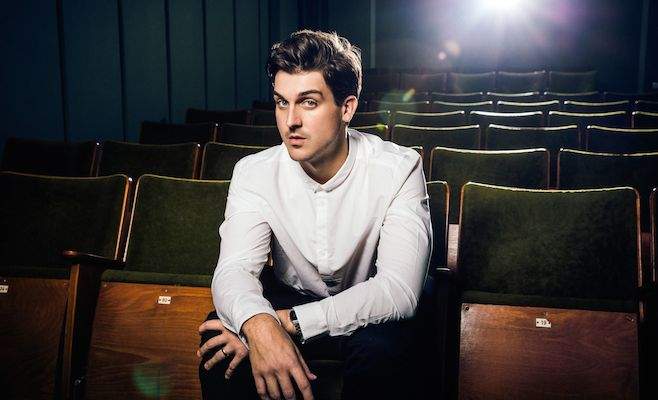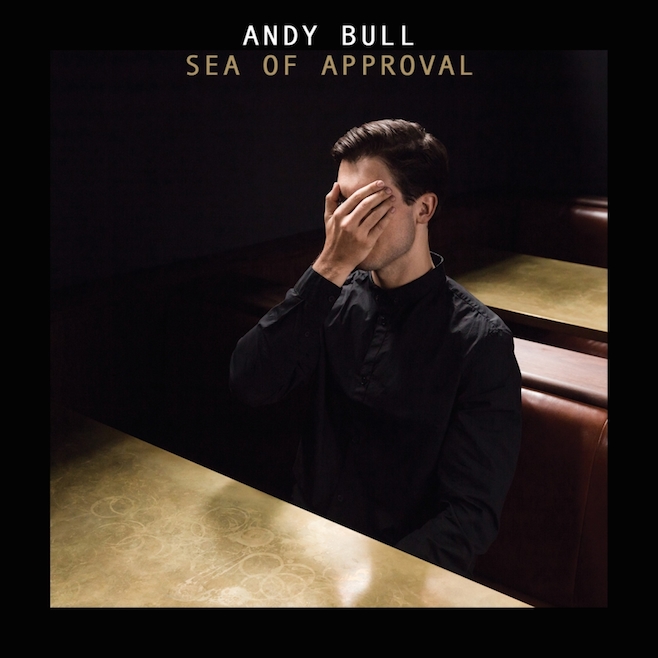Andy Bull Talks DIY Production, Staying Sane and Second Album Pressure
"Humility, patience and all the stuff that gets a bad wrap is important; we love the stories of creativeness being a huge, violent mess."
Andy Bull is on one big ol' ride. The Sydney-based singer/songwriter has been unfathomably busy over the past year, juggling tour dates and life commitments while penning and producing his second album, Sea Of Approval. Just released on July 11, the 29-year-old's new record is a brilliant blend of insightful lyricism and exquisite electro pop. Bull's unique vocals and his knack for catchy hooks have caught the ears of listeners Australia-wide.
Bull's latest three singles have notched up hours of radio play; you've definitely heard his voice on the airwaves. 'Talk Too Much', 'Keep On Running' and 'Baby I Am Nobody Now' have helped build anticipation for his second LP, which was almost entirely written and self-produced by Bull.
We spoke to the Sydneysider not long after the announcement of his national tour in support of Sea Of Approval, starting September. An insightful young pop virtuoso with a unique take on the creative process, Bull took us through his penchant for DIY, staying sane in the business and dealing with second album demands.
You've been unbelievably busy this year, how has 2014 run so far?
I worked on the album over the last 12 months and I was busy, like some sort of insect in its hole, which was intense and strangely removed. Now that it is done, it's busy in this really external way; promoting, talking, playing and emerging back into the world sort of thing.
You've just put out your second album, Sea of Approval, how long has it been in the works?
Although it's been four years since I've put something out, this album was really done in the last 12 months. It was a pretty intensive period. There were ideas that were a bit older that had been hanging around, but the earnest work was pretty compacted.
When you started piecing together the songs, was there any overall stylistic plan that you were working towards?
Before I had songs, I had a vague idea of mood and sentiment. I had a sense of what I wanted, what I wanted it to feel like. It's a really hard thing to articulate until you start writing and recording and trying to materialise it. You have a sense of it all, but you don't really know if you can do what you are feeling and you don't really know how you will do it.
The songs kind of came out of that initial mood and vision, but I didn't necessarily set out to do a full album. It began as a couple of tracks to see how they would go, to see if I could produce them myself and if anyone would care. It went well initially and then there was an expectation to do an album, so I got to work on it.
At what point did you hit your groove? When did you know these songs would make a good second album?
To be frank, it was very hard to get a groove going for a while. I did everything myself — I was being songwriter, lyricist, musician, producer, technician and rough mixer. I was doing all of those things constantly and I was trying to find solutions to creative problems and I didn't know where to locate the solutions.
I got on a roll intermittently, but I wasn't cruising for 12 months. I generated so many ideas and about 30 percent clicked. You have a good day and on that day you will be more productive than the past two weeks. It's about slow builds; one day something will click.
Did you do anything differently this time around?
I wanted to take a hard look at myself. What you realise is when you step into a room you see that you aren't really on your own, because you have brought with you ten years of habits, values and aesthetics that you have inherited from other people. You've always got tonnes of baggage. Being alone and being willing to change your process, work hard and work against your old habits really makes a difference.
The biggest change was an internal change where I didn't want to do what I had done before; I wanted to dig a little deeper and make music that matched my internal world in a more compelling way, using sounds and lyrics that told a vivid story and that the sounds would feel more personal, less traditional and more human. I wanted a change in tone, a different intent — not just to make things that worked and was pretty, but something that was useful to me.
Is it more nerve-wracking for you that this album is focused entirely on you and what you can create alone?
Not nerve-wracking in the way you might think or that I might have expected. I am trying to, in my adult life, develop values and standards that are mine regardless of the expectations of other people. While I am sensitive to the reactions of other people, what I realise is that what I do has no potential value unless I am going to adhere to standards that are personal to me. It's a weird paradox; if you're not willing to abide by what you have done it might not have value in the outside world.
In a way it's not nerve-wracking because I stand by what I have done, and although it's not perfect, it's a result of genuine questions and intent. When people judge it or decide that they like it or don't like it, that's fine because it is part of the process. It's not the end point or the beginning point, it's just part of the 'biz'.
You've had three songs from the album do very well already, was that always part of the plan – to slowly trickle the songs to gauge a reaction?
It was mostly because I didn't have an album finished. In the beginning I didn't know if I wanted to do an album or anything. I put a song out that I quite liked, 'Keep On Running', and it did quite well and people wanted another one. The next one I finished was 'Baby I Am Nobody Now' and then 'Talk Too Much' — it was really all on the go.
Maybe it was the idea, but it also gives you a lot of pressure. There is no way to do this stuff without pressure. Once you put out a single, people expect another one. When you put out another one, people expect a record. I was constantly working to finish a record and to make it a good one, not a rushed one. You have to find a way to work comfortably, to have a buffer. If you are more focused on meeting a deadline then it narrows your options prematurely. If you are trimming before you have time to play, then sometimes your ideas don't come to fruition.
You've mentioned how important it is "to stay sane and keep your integrity" when creating new work — how do you do that? How does that statement hold now that your album is out there?
This is the key question in any process. Staying sane is basically about being gentle; having a self awareness and integrity means choosing what you are going to put your attention on and how you are going to interpret the events you are experiencing. To me, that's what sanity and integrity are — being able to analyse but not judge, being able to experience emotion without losing yourself to it, that sort of thing.
How do you do that? It's difficult, but it's key. You've got to go slowly, appreciate that what you are doing is a long difficult process. You take a step forward and two steps back, you have to have a level of gentle acceptance if you want to stay sane in this environment. Keeping your integrity or authenticity is almost the same thing; if you can keep a calmness about yourself it allows you to choose what you are going to focus on and stay a step ahead. It takes constant maintenance to keep control of your attention and focus. Humility, patience and all the stuff that gets a bad wrap is important; we love the stories of creativeness being a huge, violent mess. That is a part of it but only a small part of it.
I didn't necessarily do it well along the way, but the songs that I finished are the songs where I managed to find that headspace.
If you gave your album to someone to listen to for the first time, what would you hope they respond to or take away from it?
It's hard to say. Now that it has been given to people, it is amazing how many different responses there have been. The most you can hope for is that it would be of some use to people. You hope that it makes them feel ok about where they are at. In music you try to handle the ambiguities of life, the hope, the despair, all of the things because that is what life is. The best thing that music can do is even out the kinks in life. If you can even people out, that would be good.
Sea Of Approval is out now through Island Records.
Andy Bull National Tour Dates:
Sep 7 — Spiegeltent at Brisbane Festival, Brisbane
Sep 13 —The Metro, Sydney
Sep 27 — Corner Hotel (SOLD OUT), Melbourne
Sep 28 — Corner Hotel, Melbourne







